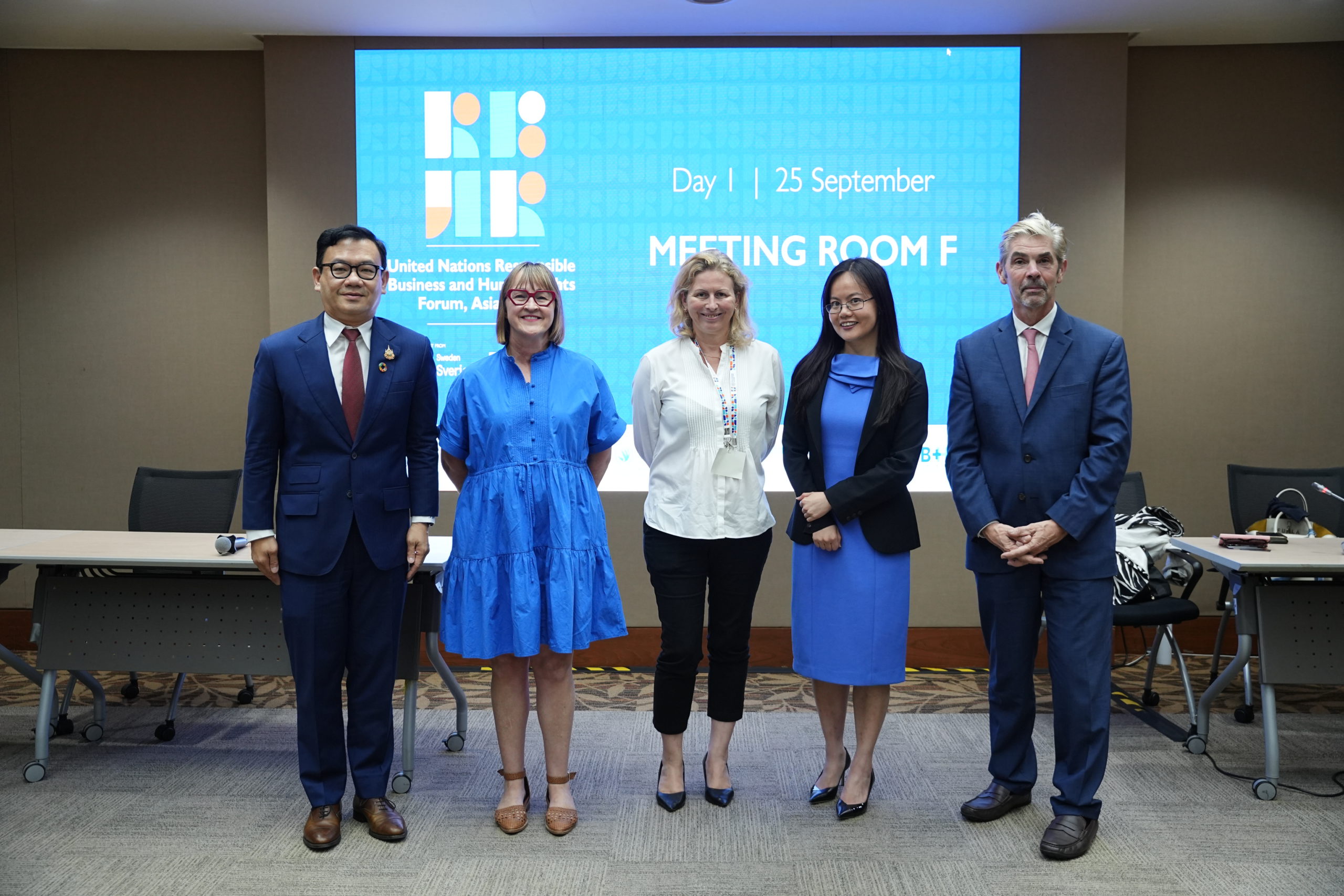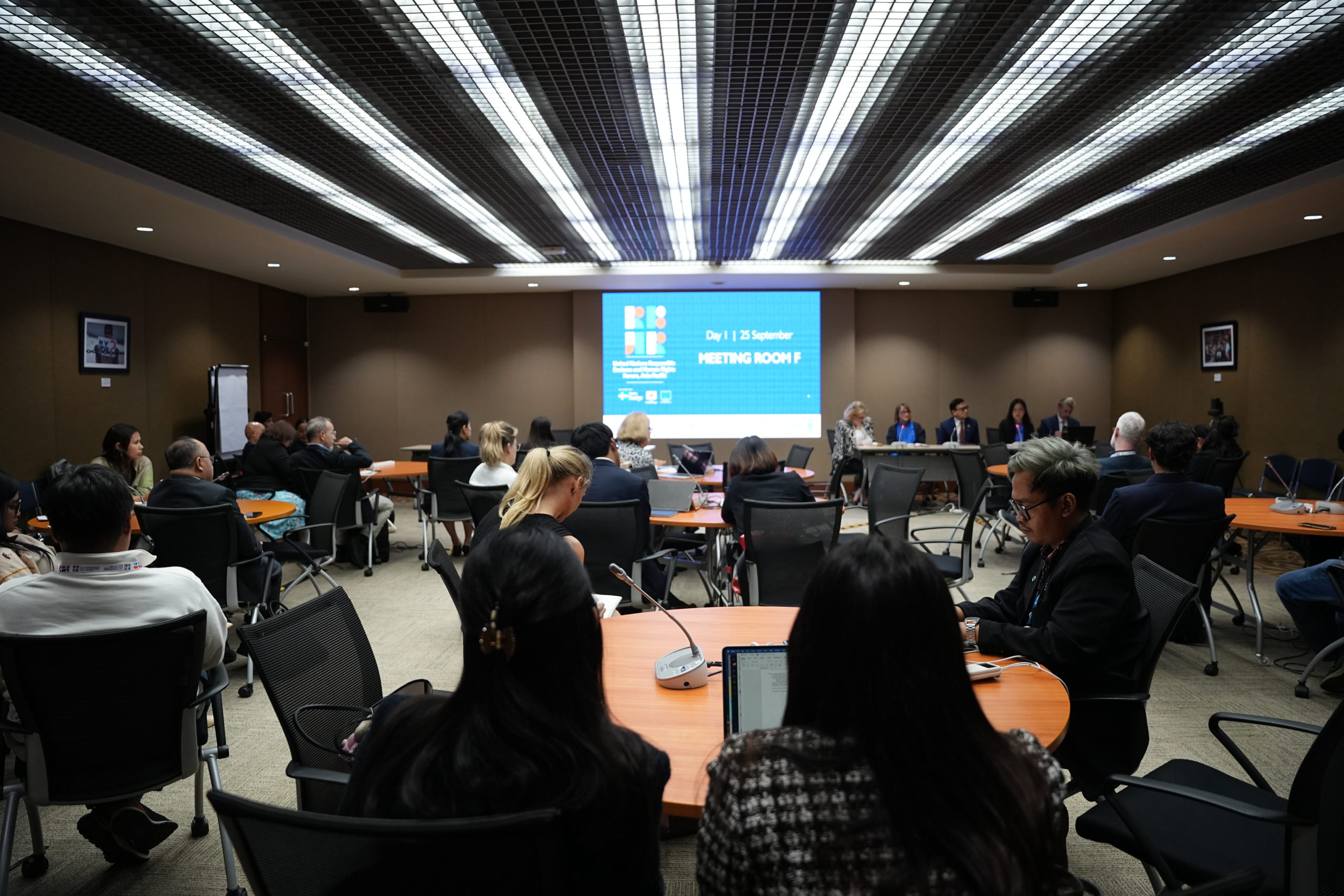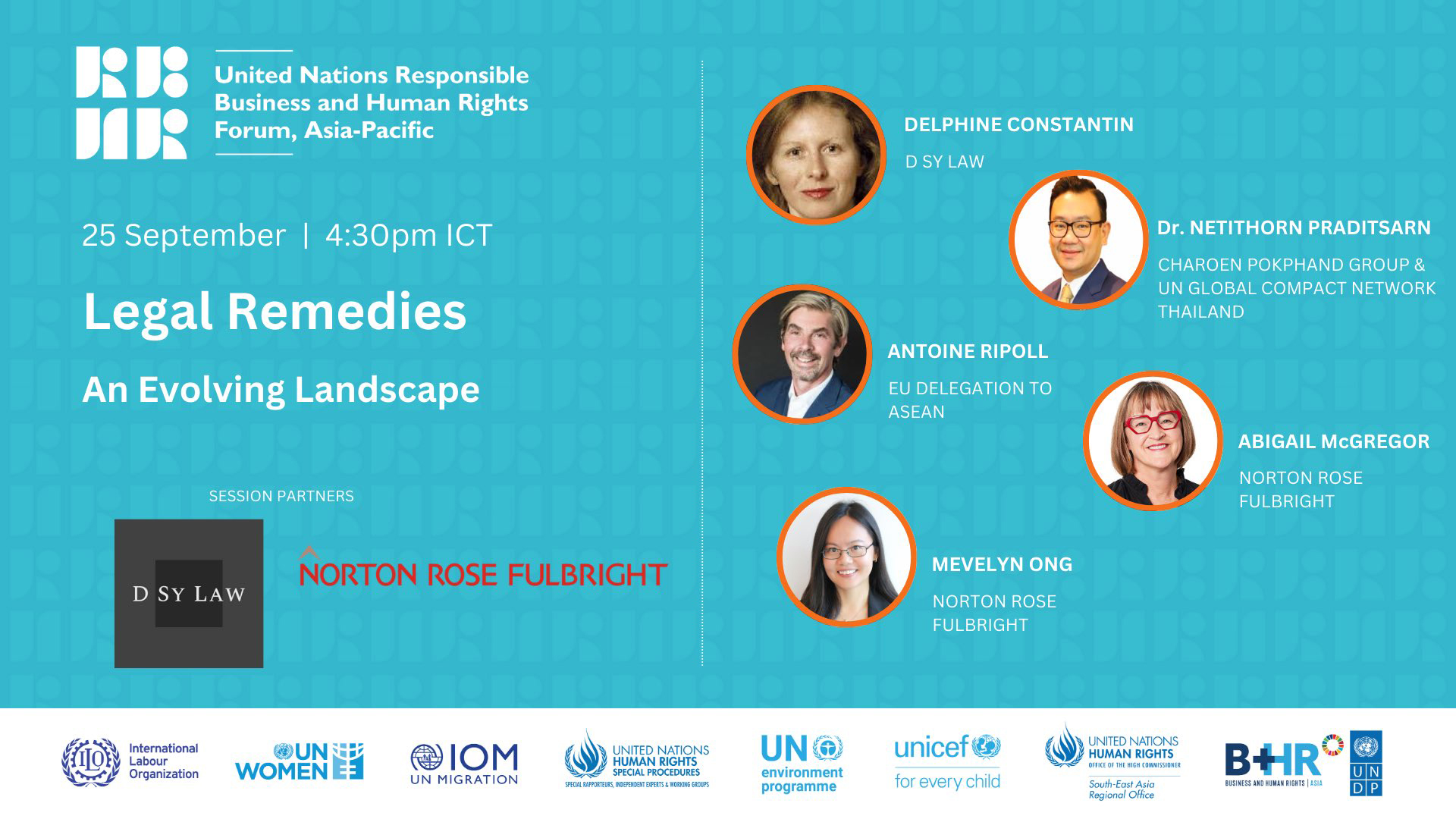
24 – 25 กันยายน 2567 เครือเจริญโภคภัณฑ์ ได้รับเชิญในฐานะผู้นำภาคธุรกิจไทยเข้าร่วมเสวนาในเวทีสหประชาชาติระดับภูมิภาคเอเชียแปซิฟิก เรื่องการดำเนินธุรกิจที่รับผิดชอบและสิทธิมนุษยชน ครั้งที่ 6 ( the 6th United Nations Responsible Business and Human Rights Forum) โดยปีนี้หัวข้อการประชุม เสวนาเน้นเรื่อง The Remedy Blueprint: Bridging Gaps and Accelerating Access (แผนงานด้านการเยียวยา: ปิดช่องว่างและเร่งการเข้าถึง) วัตถุประสงคของการจัดงานคือ เพื่อเป็นเวทีให้ภาคส่วนต่าง ๆ กว่า 1,800 คน จาก 100 ประเทศทั่วโลกได้มาร่วมแลกเปลี่ยนความคิดเห็นและประสบการณ์ด้านธุรกิจกับสิทธิมนุษยชน โดยเน้นการประเมินความก้าวหน้าและอุปสรรคในการเข้าถึงการเยียวยาในภูมิภาคเอเชียและแปซิฟิก รวมถึงการแลกเปลี่ยนความรู้ระหว่างกันเพื่อนำนวัตกรรมมาใช้ส่งเสริมการเข้าถึงการเยียวยาที่มีประสิทธิภาพ

ดร.เนติธร ประดิษฐ์สาร เลขาธิการสมาคมเครือข่ายโกลบอลคอมแพ็กแห่งประเทศไทย (UN Global Compact Network Thailand: UNGCNT) และผู้ช่วยบริหาร ประธานคณะผู้บริหาร และรองกรรมการผู้จัดการอาวุโส สำนักความร่วมมือระหว่างประเทศด้านความยั่งยืนและสื่อสารองค์กร บริษัท เครือเจริญโภคภัณฑ์ จำกัด ได้รับเชิญเข้าร่วมเป็นผู้อภิปราย ใน 2 การประชุมใหญ่ที่มีความสำคัญ ดังนี้
- Case Study on transboundary human rights impacts and remedy in ASEAN โดยกล่าวถึงความก้าวหน้าของธุรกิจไทย ในภาคอุตสาหกรรมประมงต่อเนื่อง ที่สามารถยกระดับการเข้าถึงการเยียวยาของแรงงานข้ามชาติ ผ่านกิจกรรมต่างๆ อาทิ การสร้างช่องทางการร้องเรียนที่หลากหลายในภาษาที่แรงงานเข้าใจ การสร้างพื้นที่การเจรจาระหว่างฝ่านบริหารและตัวแทนแรงงานข้ามชาติ ผ่านช่องทางคณะกรรมการสวัสดิการแรงงาน การทำงานร่วมกับคู่ค้าขนาดเล็ก ขนาดกลาง เพื่อยกระดับการเข้าถึงกลไกการร้องทุกข์และการเยียวยาตลอดห่วงโซ่อุปทาน และการพยายามนำเทคโนโลยีต่างๆ มาใช้ อาทิ Blockchain เพื่อส่งเสริมและคุ้มครองสิทธิแรงงานในด้านต่างๆ
- Legal Remedies: An Evolving Landscape ดร.เนติธร ได้กล่าวถึงความสำคัญของ tone from the top หรือนโยบาย/เจตนารมณ์ของผู้บริหารที่ชัดเจนในเรื่องของการส่งเสริมการข้าถึงการเยียวยาที่มีประสิทธิภาพ การนำนโยบายดังกล่าวไปปฏิบัติที่ต้องมีการกำหนดเป้าหมายและการติดตามผลที่วัดการเปลี่ยนแปลงได้ การสร้างความเป็นผู้นำและการยกระดับคู่ค้าในห่วงโซ่อุปทาน รวมถึงการพยายามนำเทคโนโลยีหรือนวัตกรรมมาใช้เพื่อส่งเสริมการเข้าถึงการเยียวยาที่มีประสิทธิภาพ ดร.เนติธรกล่าวทิ้งท้ายว่า การบรรลุเป้าหมายด้านธุรกิจกับสิทธิมนุษยชนต้องอาศัยความร่วมมือจากทุกภาคส่วนเพื่อให้ทุกฝ่ายพยายามแข่งขันกันทำดี (race to the top) และต้องไม่ทอดทิ้งประเทศหรือคู่ค้าที่ยังต้องการความช่วยเหลือเพื่อลดความเสี่ยงด้านสิทธิมนุษยชน ด้วยการจัดหาที่มุ่งเน้นความยั่งยืน โดยไม่ทิ้งใครไว้ข้างหลัง

C.P. Group Participates in the 6th United Nations Responsible Business and Human Rights Forum (UNRBHR Forum), Asia-Pacific
On September 24-25, 2024, Charoen Pokphand Group (C.P. Group) represented the Thai business sector at the 6th United Nations Responsible Business and Human Rights Forum in the Asia-Pacific region. This year’s forum was themed “The Remedy Blueprint: Bridging Gaps and Accelerating Access.”
The event gathered over 1,800 participants from 100 countries, providing a platform for exchanging ideas and experiences related to business and human rights. Key discussions focused on evaluating progress and identifying barriers to accessing remedies in the Asia-Pacific, while also exploring innovative solutions to enhance effective remedy access.
Dr. Netithorn Praditsan, Secretary-General of the UN Global Compact Network Thailand (UNGCNT) and Senior Vice President at C.P. Group, participated as a panelist in two pivotal discussions:
- Case Study on Transboundary Human Rights Impacts and Remedy in ASEAN examined the strides made by Thai seafood industry to improve migrant workers’ access to remedies. Initiatives included the establishment of multiple complaint channels in languages accessible to workers, creating social dialogue spaces between management and migrant worker representatives such as a Worker Welfare Committee, collaborating with small and medium-sized suppliers to enhance access to effective remedy throughout the supply chain, and utilizing technologies such as Blockchain to protect labor rights.
- Legal Remedies: An Evolving Landscape emphasized the critical importance of a strong “tone from the top” in promoting access to effective remedy. Dr. Netithorn highlighted that achieving these goals requires setting measurable targets, monitoring outcomes, and fostering leadership within the supply chain. By leveraging technology and innovation, businesses can further enhance access to remedies.
Dr. Netithorn concluded by advocating for a “race to the top,” where all sectors collaborate to uplift one another, ensuring that no country or supplier is left behind. This collective effort aims to reduce human rights risks through sustainable sourcing, fostering an ethical competitive landscape that prioritizes respect for human rights.

